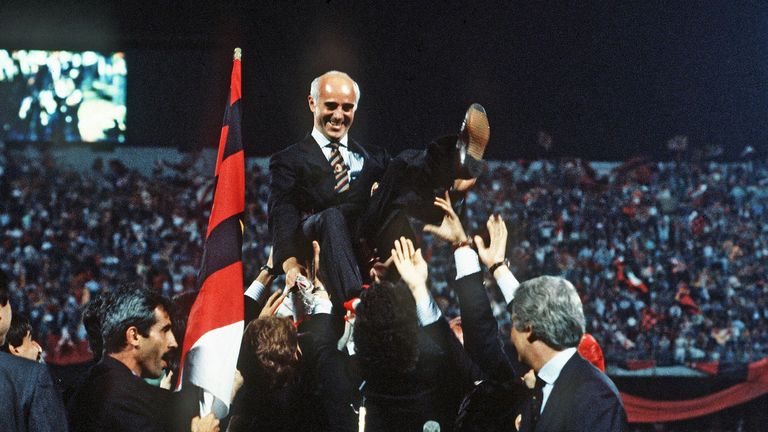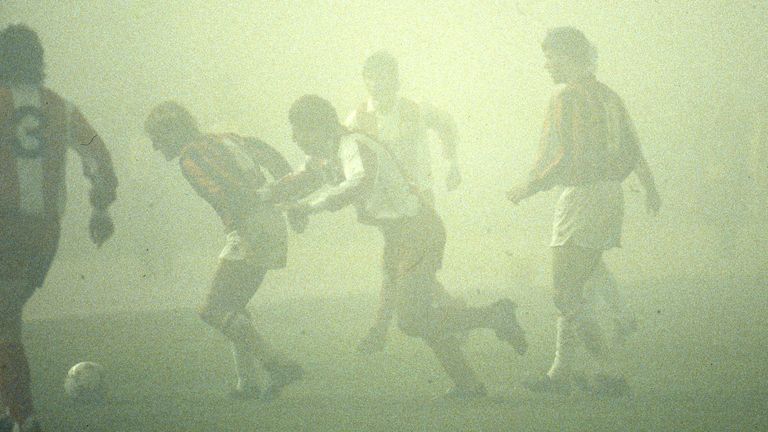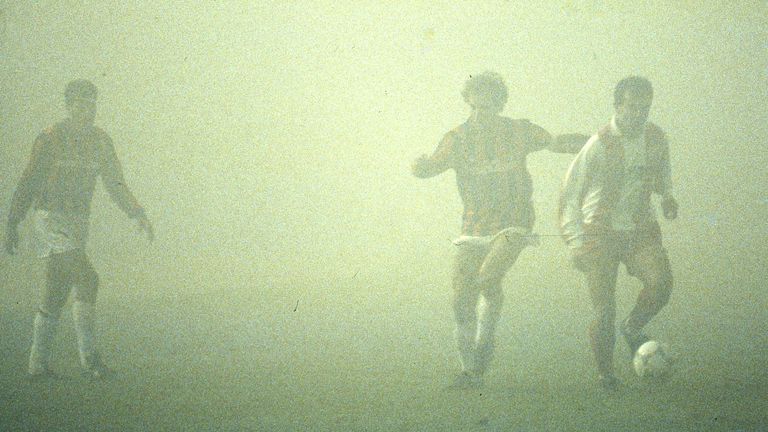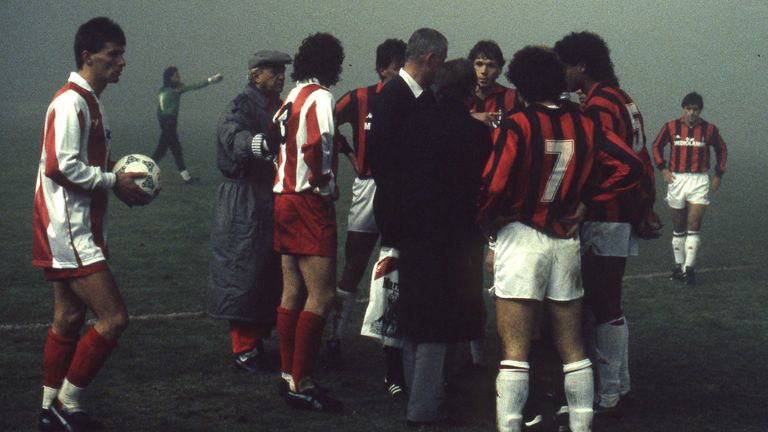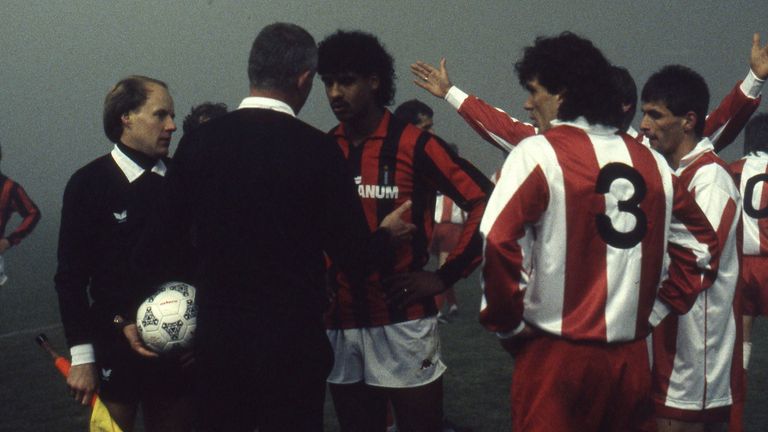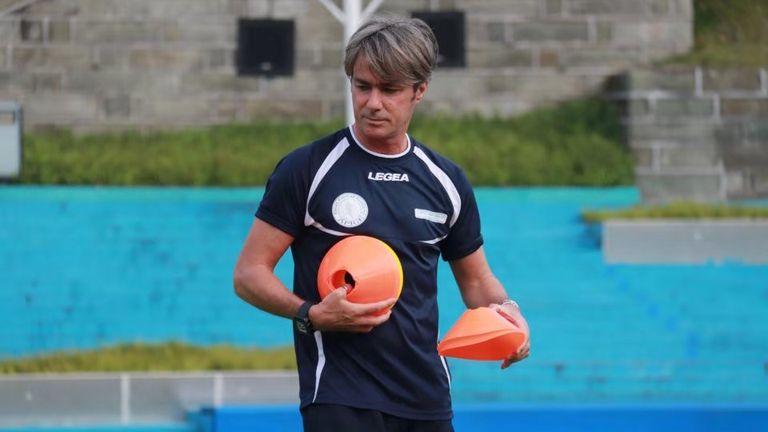How Arrigo Sacchi's AC Milan became Immortals thanks to the Belgrade fog
In an exclusive interview with Sky Sports, Graziano Mannari reveals the inside story of the night in the Belgrade fog that helped Arrigo Sacchi's AC Milan become Immortals
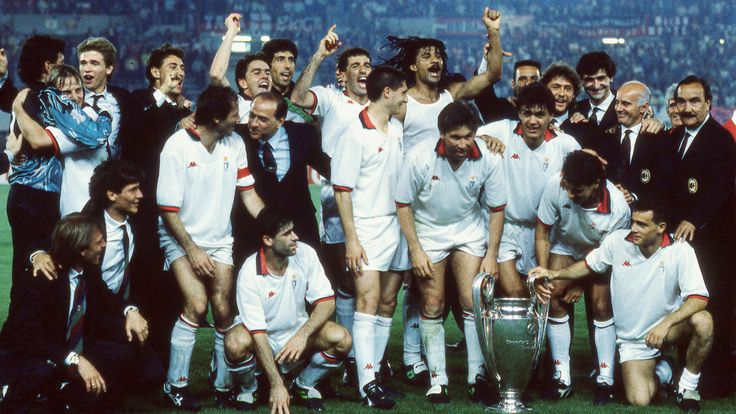
Friday 9 September 2022 13:35, UK
When AC Milan defeated Benfica to win the European Cup once again in 1990, nobody could have anticipated that it would be 27 years before another club retained the trophy. Even so, it was already apparent that this was one of the game’s greatest sides.
Milan boasted world-class defenders in Franco Baresi and Paolo Maldini. They had a trio of famous Dutchmen led by the imperious Marco van Basten. And it was all masterminded by Arrigo Sacchi, the former shoe salesman who helped to transform the game.
"Our style of play was totally different," former forward Graziano Mannari tells Sky Sports.
"Before Arrigo Sacchi, Italian football was about great defence and the counter-attack. This was football in Italy. With Arrigo, we started to press in their half. it was totally an innovation. He taught us how to play as a team. He was a great man, a great innovator.
"I realised only later that not every coach is like him because he was my first."
Mannari was not the most famous name in that Milan squad, although he remains a popular figure, supporters remembering his two goals against Juventus. He was a symbol of Sacchi's football in his own way because of the style of play he embodied.
"Sacchi did not know much about the youngsters so he asked Franco Baresi and the other senior players to tell him about some of the younger players. They told him to take me because during training they could never catch me. He called me up at 18.
"I was chosen sometimes to play instead of the other forward players just because I was very good at pressing. I was fast and I had good timing so for me it was not difficult."
Mannari could close down - "even before Sacchi I would follow the ball and chase it" - but under this autocratic new manager, determined to institute a more athletic game, he learned the nuances of the pressing that would prove too much for opponents.
"What made Sacchi so good was that he showed us how to do it in the right way with the right timing. If you just run yourself then you are the piggy in the middle. If you run with others then it is very difficult for the opposition to pass through that first line.
"That was the innovation, organised pressing.
"At the time, nobody did it. I don't remember playing against anyone that was at organised as us. Maybe if I think about the Ajax team of [Johan] Cruyff and [Johan] Neeskens in the 1970s, they were very organised, but they were organised in possession of the football.
"Out of possession, I have never seen a team do that like Sacchi's team did it."
It gave them an edge, enough for Sacchi to take Milan to the league title in 1988, having been relegated since their previous win almost a decade earlier. By squeezing high and denying space to the celebrated No 10s of Serie A, he was able to turn Milan into a machine.
It was an inspired appointment by Milan president Silvio Berlusconi, having been impressed by Sacchi's Parma in the previous season when they twice won at the San Siro. Even so, he was dubbed Signor Nessuno by the press, Mister Nobody. And the players agreed.
This was a man who had not only never managed at the top level but never played there either. Sacchi's famous line about a jockey not needing to have been a horse is pithy now. At the time, his lack of experience was a problem in convincing these stars to trust him.
"At the beginning, it was hard because while the players were used to playing zonal marking, the zonal marking that we played was very slow, without any pressing.
"When he came from Parma, and told the big players they had to do it another way, it was difficult. He was showing videos of other players who were not as good as them. Everybody was just looking at him. It can be hard for an innovator. There was not a good feeling."
Fourth going into the winter break, Milan did not lose again. The mood changed.
"When they started to realise that they were winning matches by playing his system, by following his instructions, then they started to enjoy themselves and have fun.
"That is when they realised how good the ideas of the man were."
Sacchi won Serie A only once, the competition was fierce in that era. But he is defined by his conquering of Europe, not once but twice. That first success culminated in the 4-0 demolition of Steaua Bucharest in the 1989 European Cup final, a victory margin that has never been bettered.
Perhaps the most famous win along the way was the 5-0 thrashing of Real Madrid in the second leg of the semi-final in front of 73,000 fans in the San Siro, featuring five different scorers. It was a symbolic transferral of power. The old kings making way for the new.
But none of those era-defining moments would have been possible were it not for the events of November 1988 in Belgrade. Milan might not have been in the competition the following season let alone won it had the fog not come to their rescue that night.
Sacchi's side were a goal down and a man down against Crvena Zvezda, better known as Red Star, with the game into the second half when the referee was forced to abandon proceedings. A replay over 90 minutes was scheduled for the next day, the score reset.
Milan won that on penalties. The rest is history.
Dragan Stojkovic, the captain of Red Star, has said that great Milan side was 'born in the Belgrade fog', while claiming Milan's director Adriano Galliani still jokes with him that they have the weather conditions that night to thank for everything that followed.
"That was the toughest team that we played against," says Mannari. "I am not saying that to take anything away from Real Madrid but this one was the most difficult for us.
"We won the European Cup there in Belgrade."
While Mannari acknowledges "it was very controversial" few dispute the fact the game could not have continued that evening.
"I was on the bench for the first match but we could not see anything that was happening on the pitch because of the fog," he recalls.
The conditions were so bad Sacchi had to be informed that Dejan Savicevic had put Red Star ahead. They had missed the goal. He only discovered that Pietro Paolo Virdis had been sent off when he turned to the striker back inside the dressing room and spotted that he was already fully clothed.
"It was impossible to play, we just heard the voices of the fans who were screaming that there had been a goal and it was 1-0 to them. It was surreal. Then, the referee suspended the match. We did not know that we were going to play the next day. We knew nothing."
If Milan's superior athleticism was an advantage with the game being played again so soon afterwards, and given the energy expended by Red Star, other factors were against them.
The red card for Virdis and a booking for Carlo Ancelotti meant both were suspended for the second game.
"We did not know the rules," admits Mannari. "Nowadays, if they had been suspended they would have played the next day but it wasn't like that."
There was also the circumstances of an intimidating away day to contend with in a country on the brink of breaking up.
"There was a kind of civil war going on," he adds. "We never left the hotel. We did our warm-up on the morning of the match there."
There were nearly 100,000 fans packed into the Marakana for the first game, but the second was even noisier, the gates having been opened. The official figure was lower but few believe it. Ruud Gullit calmed the nerves by telling his team-mates they were there to see Milan.
Alessandro Costacurta replaced Ancelotti. With Virdis suspended and Gullit only fit enough to be among the substitutes, the young Mannari was also thrust into action. Yugoslavian television knew so little of him that his name was spelt incorrectly on the team graphic.
"Sacchi told us that night. It was a bit scary. I was 19. We have to play here in front of all these people? It was like a war for them. But at the time, I did not care too much. My attitude was that I was fast and they could not catch me. I just wanted to play.
"I remember during the warm-up it was very cold. We went to do some sprints. Costacurta wound me up. He was saying, 'Graziano, today you are not so fast.' He did it intentionally.
"After that, I relaxed and everything was good. Everything except that I could have scored two or three times. At that time, it was impossible to score. Even when the ball went in, the referee said no - and it was one metre and a half inside. It was a nightmare."
There was trauma at half-time. Roberto Donadoni had been involved in a clash with Red Star left-back Goran Vasilijevic that resulted in the Milan midfielder swallowing his tongue. A physio had to break his jaw to clear the airways just so he could breathe again.
"It seemed like he was dead on the pitch."
There were tears in the dressing room, but resolve too.
"The big players like Baresi and Van Basten transferred that belief to us that we could do it, we were better. Then, everybody believes. When we went to penalty kicks, we were not scared. Everyone believed."
Mannari had been substituted in the final minutes, replaced by another youngster, Massimiliano Cappellini, with a view to him taking a penalty. The plan soon changed.
"Then Frank Rijkaard said to Sacchi, 'No, don't destroy him, let me take the penalty'. Sacchi said, 'But you never take penalties'. He said, 'I don't care. If I miss, I can take it. Cappellini is 17'. That is why he is a great guy."
Rijkaard scored the winner. Donadoni recovered.
"Everything worked out," says Mannari.
"There were so many good characters. Every one of them was helping us, giving us a hand when we needed it and shouting at us when we needed it. This feeling that it was a real team, it was amazing, really. I think it would be hard to find so many champions together."
Milan went on to concede only one more goal in their remaining five matches in winning that European Cup - the stories about their defence legendary. There were the sessions in training where the back four would try to keep out as many as 10 attackers.
"Baresi was a giant, very fast, very technical. If you wanted to beat Maldini, you would have to get past him three times because he would always come back. I rank them as the best two defenders ever. When you faced them in training, the matches were much easier."
Knee injuries curtailed Mannari's progress. But he remains a child of Milan, having spent many years working within their coaching schools around the world.
"I was basically born there with the ideas of Milan," he adds.
"I did not see all the great teams, of course. Later, there was Barcelona. But that Milan team was one of the best. Despite not playing many matches, the fans remember me. I could have done more but I could have done less. I am proud to have played a small part in it."
He is not alone. Mannari notes that many of Sacchi's side have been successful coaches with Rijkaard and Ancelotti even winning the Champions League.
"They had this imprint from him, I think," he says.
But the man himself saw his own coaching career fizzle out in his 40s.
Why did one of the game's great innovators not maintain it?
"He used to live for football, 24 hours a day just watching videos. He was one of the first who used to do the scouting and tactical analysis on paper, not on computer like now. One of his staff would be up in the stands counting the passes. He was a real innovator.
"This full-time, 24-hour thinking about football, it left him exhausted, I think. You can only do that for a short period of time. But even now he analyses the game in a great way. Maybe he is not on the pitch but he is still a genius. He is an encyclopaedia of football."
And besides, his legacy is assured.
Thanks, in part, to those strange nights in Belgrade.
"That was it," says Mannari.
"That was the match that changed everything for us."

